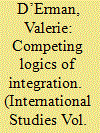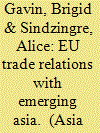| Srl | Item |
| 1 |
ID:
178028


|
|
|
|
|
| Summary/Abstract |
The European Union’s (EU) external trade policy has long been championed by scholars and practitioners alike as one of the great accomplishments for European integration. The UK’s exit from the EU in 2020 offers many precedents; one of which is the current negotiation of a trade deal between the EU and a former important member of the single market. This paper outlines the trade negotiation process between the EU and the UK and the resulting Trade and Cooperation Agreement (TCA) against the backdrop of the COVID-19 pandemic to forecast the broader potential evolution of EU trade policy. The increasing visibility of nationalist and protectionist statements in various instances of political communication suggests a major shift in multilateral norms away from the liberal-international emphasis on heightened trade and interdependence. The implications for the EU external trade policy are a re-direction of efforts toward internal single market cohesion, and a more cautious approach to future potential trade agreements.
|
|
|
|
|
|
|
|
|
|
|
|
|
|
|
|
| 2 |
ID:
086406


|
|
|
|
|
| Publication |
2009.
|
| Summary/Abstract |
Trade interdependence between Europe and Asia has rapidly increased in recent years. Europe-Asia trade flows now constitute a 'third link' in the global economy. As trade expands, however, global trade governance has declined and free trade agreements (FTAs) have increased. Hence, the Global Europe strategy has been designed to enhance trade relations with emerging Asia which is the most dynamic region in the global economy today. But Asia's model of export led growth leaves it more exposed to shocks emanating from outside the region than ever before raising questions about its sustainability. Deep integration agreements between Europe and Asia are needed to foster economic growth. They also need a development dimension to help Asian countries address their key development challenges.
Brigid Gavin was the Research Coordinator of the workshop on 'Deep Integration and North-South Free Trade Agreements: EU Strategy for a Global Economy' which provided the papers and discussion forum for the articles in this special edition. The workshop took place at the United Nations University-Comparative Regional Integration Studies (UNU-CRIS) centre in Bruges, Belgium on 19-20 June, 2008. She wishes to express her thanks to Mr Luk Van Langenhove, Director of UNU-CRIS for financial support and to all the authors and participants in the workshop for their contribution to making this project a real success. A special word of thanks goes to Lars Nilsson, Chief Economist Unit, DG Trade, European Commission for his opening presentation to the workshop.
Alice Sindzingre is Research Fellow, National Centre for Scientific Research (CNRS), University of Paris and Visiting Lecturer at School of Oriental and African Studies (SOAS), University of London. This analysis draws from her paper 'The EU Economic Partnership Agreements with Africa' which she presented at the workshop and available on the UNU-CRIS website.
|
|
|
|
|
|
|
|
|
|
|
|
|
|
|
|
| 3 |
ID:
086410


|
|
|
|
|
| Publication |
2009.
|
| Summary/Abstract |
A number of countries have chosen recently to shift away from an exclusive support to trade multilateralism and towards regional or bilateral trade agreements. Being no exceptions in this respect, the Republic of South Korea and the European Union have engaged in a bilateral FTA negotiation in early 2007. The objective of the paper is to account for the unexpected difficulties encountered in the negotiation. The paper starts with a brief overview of the trade and investment relations between the two partners and underlines the complementarity between the two partners, as well as their respective offensive and defensive interests. As a next step, the paper delves into the "politics" of the FTA negotiation with a view to highlighting the motivations and objectives of the various partners involved. It comes to the conclusion that the major reason why the negotiation turned out to be more complex than initially expected relates to the two partners' diverging views as to what a discriminatory FTA should imply.
The present research has
|
|
|
|
|
|
|
|
|
|
|
|
|
|
|
|